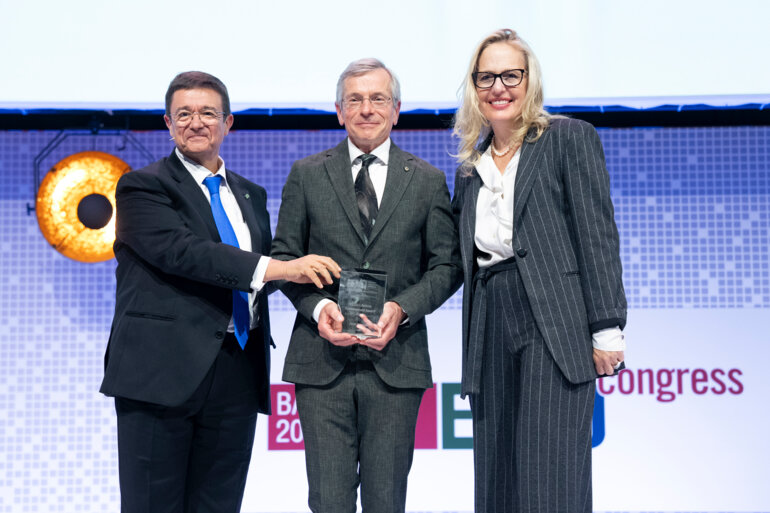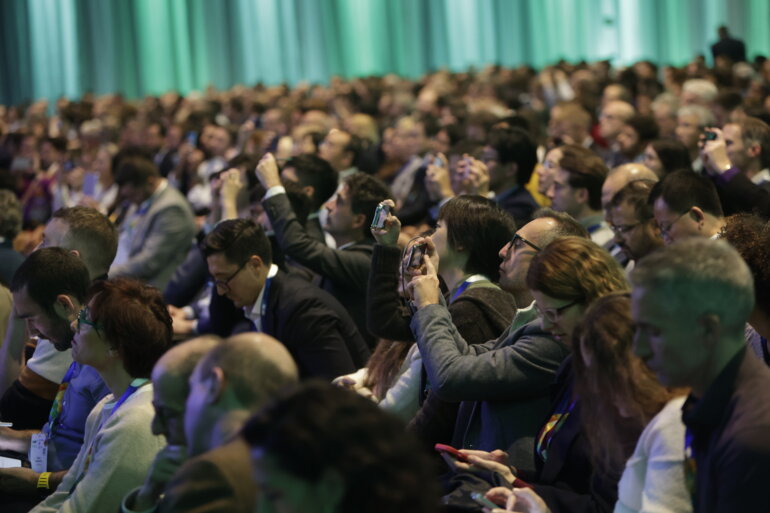For recipient of the ESMO Lifetime Achievement Award, Prof. John Haanen, melanoma research has provided him with a career full of innovation, but there is always more to explore
At the ESMO Congress 2024 (Barcelona, 13–17 September), Prof. John Haanen from the Netherlands Cancer Institute, Amsterdam, will receive the ESMO Lifetime Achievement Award for his ground-breaking research into cancer immunotherapies, from checkpoint inhibitors to cellular strategies.
What inspired you to pursue research in melanoma?
The position I was offered at the Netherlands Cancer Institute, almost 25 years ago, involved treating patients with melanoma and kidney cancer. As both diseases had been shown to have at least some sensitivity to immunotherapy, and my key interest was in that field, I agreed to take on the position. At the time, there were very few treatment options for patients with metastatic melanoma and because of dismal survival rates, very few patients were still alive after one year. This continued until 2007–2008, when we started participating in clinical trials with immune checkpoint inhibitors blocking CTLA-4. For the first time, we began to see long-term responses, and this boosted the field of immunotherapy enormously, including my research into the development of novel immunotherapy strategies.
How has the management of melanoma changed since you began working in this area?
When I first started, we were essentially providing palliative care and then management changed dramatically to provide active treatment with the potential for cure. Today, patients with melanoma – even metastatic disease – live much longer than a decade ago, thanks to the availability of different treatment options and combinations. Follow-up results of the CheckMate 067 study at 7.5 years showed longer median overall survival with the checkpoint inhibitor combination, nivolumab plus ipilimumab, compared with either nivolumab or ipilimumab alone (72.1 months versus 36.9 months and 19.9 months, respectively) (J Clin Oncol. 2022;40(Suppl): 9522). Results from the 10-year follow-up of CheckMate 067, to be presented here in Barcelona (LBA43), will show just how far we have come. However, the advent of immunotherapy has also brought about its own challenges with the emergence of immune-related adverse events. While dacarbazine chemotherapy for melanoma was well tolerated, adverse events with immunotherapy were novel to us and we had to learn how to manage these.
What are your key contributions to the progress made in melanoma management?
An important contribution has been my participation in phase III trials, including CheckMate 067, that led to the approval of immune checkpoint inhibitor therapy for melanoma. In this way, we were able to offer patients the opportunity of taking part in a clinical trial and receiving highly effective treatments, while familiarising ourselves with their toxicities and finding ways to manage these. As a team at the Netherlands Cancer Institute, we also worked on bringing forward the use of these agents to earlier lines of therapy in many tumour types.
The first clinical trial I initiated at the Netherlands Cancer Institute recruited patients with stage 3 BRAF-mutated disease that was so bulky the surgeon warned that it would not be possible to perform a radical resection. We pre-treated patients with 8 weeks of BRAF/MEK inhibitor therapy and, following subsequent surgery, all patients undergoing surgery achieved a complete (R0) resection. This was our first indication that neoadjuvant therapy was highly effective. My colleague Christian Blank went on to explore this approach further using immunotherapy, with even better results, particularly in the long term. I have also contributed to studies of neoadjuvant therapies in other disease types, including head and neck cancer (Nat Commun. 2021;12:7348), squamous cell carcinoma of the skin (J Clin Oncol. 2023;41(Suppl):9507) and colon cancer (Nat Med. 2020;26:566–576; N Engl J Med. 2024;390:1949–1958).
While tumour infiltrating lymphocytes (TILs) were the brainchild of Steven A. Rosenberg, we brought this treatment to the next level for patients with metastatic melanoma. For this, we conducted a phase III trial with colleagues from Denmark that demonstrated significantly improved progression-free survival for TIL therapy compared with ipilimumab (Ann Oncol. 2022;33(Suppl 7):S808–S869, LBA3; N Engl J Med. 2022;387:2113–2125). TIL therapy is now standard of care in the Netherlands and Denmark for suitable patients with melanoma, and our aim is to achieve EMA approval for the wider adoption of this treatment.
I was also involved with ESMO in the preparation of the first clinical practice guidelines on the management of immunotherapy-related toxicities in 2017, in response to a clear need by clinicians. These guidelines have been updated over the years.
What future treatment developments are there for melanoma?
In terms of next steps, with a focus on cell therapies and TIL in particular, key questions relate to not only improving their efficacy, but also on making them safer. Two components of TIL therapy are highly toxic: high-dose chemotherapy is used in preparation for TIL infusion, while after infusion, stimulation of TIL activity requires cytokine therapies, such as high-dose interleukin-2. A key focus should be on reducing the toxicities of these components not only to improve their tolerability, but also so that treatment could be offered to a broader range of patients, such as older people and those with comorbidities.
Furthermore, information learned from the study of TILs shows us the specific T cells responsible for their immune effects. This raises the potential for finding new targets and T-cell receptors that we can genetically modulate with ‘fit’ T cells from the patient’s blood to create a more ‘synthetic’ TIL product with improved efficacy.
Finally, important avenues of research include finding effective treatments for patients who do not respond to ipilimumab and nivolumab, as preventing patients from developing stage 4 disease is crucial, while the identification of biomarkers would help better select patients for specific treatments. There is also much exciting research using oncolytic viruses and mRNA vaccines that could prove useful in the future – the possibilities appear endless.
Programme details
Haanen J. ESMO Lifetime Achievement Award lecture: Empowering T cells to fight cancer. ESMO Congress 2024
Opening Session, 13.09.2024, h. 12:00 – 13:45, Barcelona Auditorium – Hall 2
J. Larkin, et al. 10-y survival outcomes from the phase 3 CheckMate 067 trial of nivolumab plus ipilimumab in advanced melanoma. ESMO Congress 2024, LBA43
Mini Oral Session – Melanoma and other skin tumours, 15.09.2024, h. 14:45-16:15, Oviedo Auditorium – Hall 3








